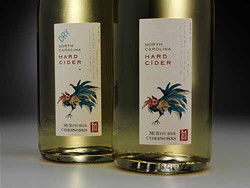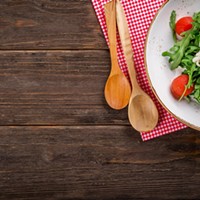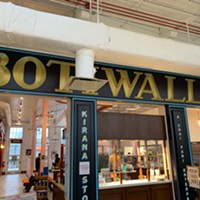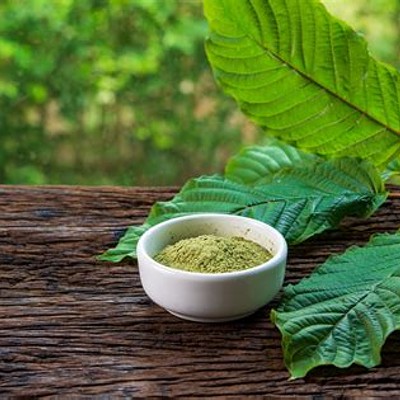Before Coca-Cola found its way down the gullets and onto the palates of Americans in 1886, hard apple cider, another effervescent drink, had been one of the most popular drinks in the U.S. In fact, hard cider had been the preferred alcoholic beverage, even touted by our founding fathers. When beer production arrived with German immigrants, cider's popularity diminished. But it was 20th century prohibition which ended most U.S. cider production and, subsequently, its recognition.
Now hard cider is making a dramatic comeback. Brad Johnston, President of Tryon Distributing, a North Carolina wine and beer wholesaler, notes sales of hard cider increased by 14.6 percent from 2008 to 2009. "Any beverage that could have that kind of increase between those two years is significant," Johnston says, adding that wine sales dropped during that same period.
Across the state, Tryon's hard cider sales are remarkably stronger in the Raleigh-Durham and Asheville markets, both areas with large college-age populations. "It's the generation of Juicy Juice drinkers," says a local Charlotte DJ -- and ardent beer drinker. "They grew up with cartons of apple juice."
But hard apple cider does not always have a sweet apple flavor profile. Apples, in fact, have much in common with grapes, and as wine can be made either dry or sweet with a variety of flavor profiles, so can cider.
Winemaker Sean McRitchie of McRitchie Winery & Ciderworks, in North Carolina's Yadkin Valley AVA (American Viticultural Area), has been making hard apple cider since he opened his winery three years ago. McRitchie is part of the burgeoning wine industry in North Carolina and originally came to the state from the Willamette Valley in Oregon to make the first wines at Shelton Vineyards.
When McRitchie and his wife Patricia purchased land for their winery, they had some apple trees on the property and the idea of a cider press started. McRitchie currently buys from larger apple growers in Wilkes County while he is planting more trees. McRitchie is the first -- and, to date, only -- producer of hard apple cider in North Carolina, and is making the cider via a traditional method similar to wine production.
McRitchie says, "Stylistically, the way I'm making wine is capturing the fruit character. I do the same with cider." For his cider, he uses a variety of apples including Stayman, Granny Smith and Limbertwig -- a Southern heritage apple native to the mountains of North Carolina and Tennessee. Currently, he has one tank of 100 percent Stayman apple and looks forward to producing some cider from Pink Lady apples.
The advantage apples have over grapes is clear. "With grapes," McRitchie explains, "I've got three days from the time they are off the vine to press them. I've had some apples in cold storage since last fall. I can pick the time I want to produce cider."
McRitchie's ciders have a clean, fruit-forward taste profile, a balance of fruit and blossoms with an undernote of tannins. While some artisan cider makers barrel in oak, McRitchie prefers to keep his cider crisp, although he is experimenting with oak in batches he has not released. His ciders have won national awards, many against artisan cider makers from the "powerhouse" state of Washington.
Even though cider has a long history in the U.S., the problem is how to market it. The word cider is confusing. Stores and farm stands offer a non-alcoholic apple cider, the unprocessed pressed juice of an apple. Meanwhile, to the rest of the world, cider means fermented apple juice, an alcoholic beverage.
McRitchie's driest hard cider was sold at Crêpe Cellar in Charlotte's NoDa, but several months ago, the restaurant began selling McRitchie's sweeter cider. Co-owner Jeff Tonidandel said they needed to offer a sweeter cider since they have a dry cider from France.
The emerging trend in gastropubs as eateries has added to the popularity of cider, since cider is a traditional beverage found in British pubs. Strongbow is a popular British cider: Ireland produces Magners. Jim Powell of Caffey Distributing Company, which sells Magners in North Carolina, said one Irish pub in downtown Charlotte sold a half barrel of Magners in its first two days of carrying this cider. "Drinkers of hard cider tend to be those who prefer a craft beer and have a similar discerning palate," Powell says. The cost of cider is comparable to a craft beer.
In addition to artisan handcrafted cider like McRitchie's, national companies are emerging. Woodchuck is a popular draft cider from Middleburg, Vt., while Original Sin is a 6-percent alcohol cider from Manhattan. Another company is J.K. Scrumpy, from Michigan, which has been producing unfiltered and organic hard cider since the 1860s.
Hard ciders have a taste profile that lends itself to a variety of foods. McRitchie says cider can be elegant with certain foods such as pork. French crêpes are a traditional pairing for dry ciders, and Asian foods, especially Indian foods, match well. "But," McRitchie notes, "you can't beat a breakfast of waffles, bacon and a cold cider."
Know of a restaurant that has opened, closed, or should be reviewed? Does your restaurant or shop have news, menu changes, and new additions to staff or building, upcoming cuisine or wine events? To be included in our online blog, Eat My Charlotte, send information to Tricia via e-mail (no attachments, please): tricia.childress@creativeloafing.com.
Latest in Food & Drink Features
More by Tricia Childress
-
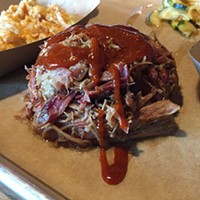
Seoul Food Meat Co's got soul
May 4, 2016 -
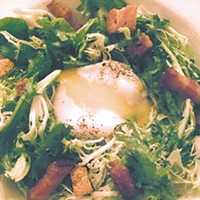
Aix en Provence flourishes in Myers Park
Apr 6, 2016 -
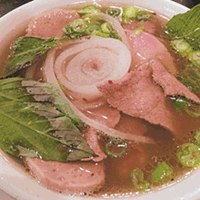
Pho and beyond at Saigon Bay Vietnamese Cuisine
Mar 2, 2016 - More »
Calendar
-

Aria Tuscan Grill Featuring Allegrini - Charlotte Wine + Food Week @ Aria Tuscan Grill
-

Angeline’s Featuring Sciandri Family Vineyards @ Angeline's
-
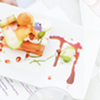
Charlotte Wine + Food Week Presented by Truist @ Charlotte, NC
-

Cakeable Cafe Grand Opening @ Cakeable Cafe
-

Haw River Wine Tasting @ Carolina Beer Temple.
-
Dorie Greenspan's Tiramisu Cake
This layered cake is definitely a "pick-me-up" with a little booze and caffeine.
-
Good Eats
The following is Creative Loafing's bite-sized guide to restaurants in the Charlotte area. We hope this reliable reference will serve as a quality source to aid in your dining pleasure. The dollar signs at the end of each item are indicative of the
-
Authentic New York-style Bagels Come to South End 1
Poppy's expands its empire

